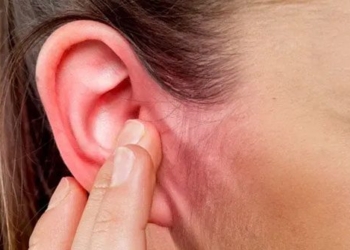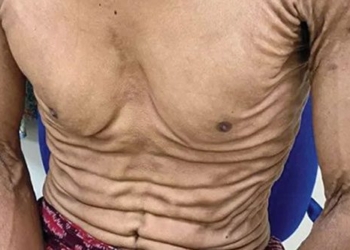Hip pain at night can make it harder for you to sleep, but the consequences don’t stop there. Tossing and turning to find a more comfortable sleeping position, combined with lack of sleep, can contribute to health problems and a decline in quality of life.
Hip Pain at Night: Causes, Symptoms, and Treatments
1. Causes of Hip Pain at Night
When your hip joints are swollen or inflamed, pain and stiffness can disrupt your sleep. Chronic hip pain may lead to symptoms like burning, aching, or a sensation of pins and needles.
1.1. Sleeping Position
People who sleep on their side, whether left or right, may experience nighttime hip pain due to stress on the joints. Additionally, a mattress that is too soft or too firm can also contribute to this issue.
Try sleeping on your back, or if you tend to sleep on your side, position yourself on the non-painful side and place a pillow between your knees to keep your hips aligned.

Frequent side sleeping can cause nighttime hip pain. (Photo: Internet).
1.2. Bursitis
Bursitis around the hip bones and other joints occurs when small fluid-filled sacs that cushion the joints become inflamed.
Symptoms of hip bursitis may include:
- Pain on the outer hip and upper thigh
- Pain that starts as a sharp sensation, causing you to wince when that area is touched, and later develops into a dull ache
- Pain when standing up after sitting for a long time, which may worsen during long walks, climbing stairs, or squatting for a while
- Pain worsening at night when lying down or sleeping on the affected hip
People with bursitis do not feel pain when standing.
1.3. Hip Arthritis
Hip arthritis occurs when the cartilage and bones inside the hip joint degenerate. Symptoms may include:
- Pain in the hip, buttocks, thigh, and knee
- Pain worsening with rain, in the morning, or after resting or sitting for a while
- Nighttime hip pain preventing you from sleeping
- Pain when bending down, getting up from a chair, or walking short distances
- Crackling or popping sounds when moving.
Besides hip arthritis, other types of arthritis can also lead to nighttime hip pain, such as rheumatoid arthritis, psoriatic arthritis, or infectious arthritis in the hip.
1.4. Tendinitis
Tendons connect muscles and bones to support body movements. When hip tendinitis occurs, you may experience symptoms such as:
- Dull or deep pain in the groin, especially when climbing stairs or standing up
- Pain in the buttocks if your hamstring is also inflamed.
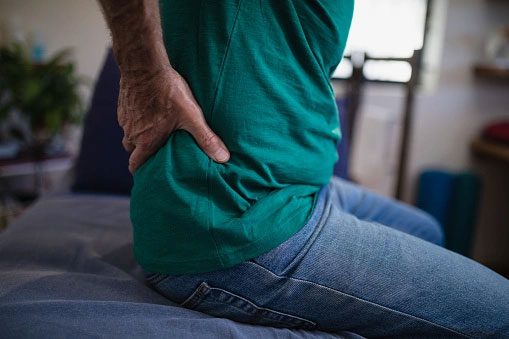
Nighttime hip pain can prevent many people from falling back asleep. (Photo: Internet).
1.5. Sciatic Piriformis Syndrome
This is a neuromuscular disorder caused by the piriformis muscle compressing the sciatic nerve, often described as a tingling sensation from the lower back down to the buttocks, and sometimes down to the legs and feet.
If you experience this syndrome, you may feel a burning sensation in your calf when trying to sleep. Alternatively, you may experience sharp pain in your foot that wakes you and prevents you from falling back asleep.
This condition may improve with lifestyle changes such as sleeping on your back or choosing a different mattress or pillow that is more suitable.
1.6. Pregnancy
Some bodily changes during pregnancy affect the hips, including the range of motion and the ability to flex and extend the hips due to the size of the fetus putting pressure on the spine and hips, particularly in the third trimester.
Although these changes are temporary, they affect mobility and how other joints (like the knees) align with the hips, impacting sleep as well.
In addition to the aforementioned causes of nighttime hip pain, other factors such as age, being overweight or obese, accidents or injuries, and knee or back pain can also contribute to this condition.
2. Guidelines for Managing Nighttime Hip Pain
There are various options for managing and addressing nighttime hip pain. For instance:
2.1. Immediate Relief
If hip pain wakes you up, try the following pain relief methods to help you return to sleep:
- Change your sleeping position, avoiding positions that exacerbate hip pain or put pressure on the painful side.
- Place an additional wedge-shaped pillow under your hip or use a pillow or blanket to support your hip.
- Place a pillow between your knees to relieve stress on the hip.
- You can try applying heat or cold to the hip; for pain caused by swelling, ice packs may help reduce inflammation. For pain from arthritis, stiffness, or muscle spasms, heat may be beneficial.
- Take over-the-counter pain relief medications such as acetaminophen or ibuprofen.
- Apply topical pain relief creams.
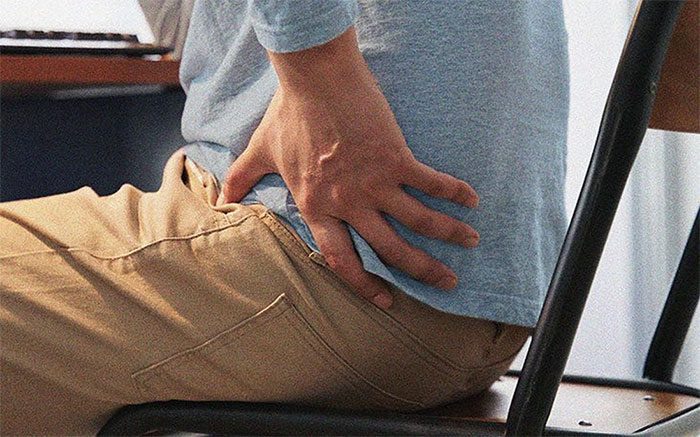
Depending on the condition of hip pain, management and pain relief methods may vary. (Photo: Internet).
2.2. Long-Term Solutions
If you frequently experience nighttime hip pain, you may need solutions for longer-lasting relief. The first step is to identify the cause of your nighttime hip pain and treat it. Long-term measures may include:
– Lifestyle:
- Replace your mattress with one that is friendlier to your hips and spine, especially for those with hip bursitis
- Engage in strengthening exercises for the hip muscles, such as walking, yoga, Pilates, or aerobics, adjusting the intensity based on your hip condition, wear appropriate footwear, and always warm up and cool down properly when exercising
- Avoid crossing your legs for extended periods
- Maintain a healthy weight
– You may consult a physical therapist for relaxing massage of the back and hip muscles to alleviate hip pain and receive guidance on exercises to help manage pain.
– Try an anti-inflammatory diet rich in antioxidants to support joint inflammation reduction in the hip.
– Take prescription medications, such as corticosteroid injections, which can provide temporary pain relief but do not address the underlying cause of the pain.
– Surgery to remove cartilage fragments or bone spurs around the hip joint
– Joint resurfacing by removing and replacing damaged bone in the hip joint
– Total hip replacement.
Note: Treatment methods will vary depending on the cause and condition of the pain. Patients should never self-medicate without a doctor’s prescription.
3. Preventing Nighttime Hip Pain
While you cannot change certain factors that may contribute to nighttime hip pain, such as age-related risks or a family history that makes autoimmune conditions more likely to contribute to arthritis, there are steps you can take to minimize the risk of hip pain, such as:
- Maintain a healthy weight
- Avoid certain sports or jobs that may contribute to overuse injuries
- Manage underlying health conditions such as diabetes or high cholesterol.
You can limit nighttime hip pain by practicing good overall sleep hygiene and taking steps to prevent injuries or worsening conditions in the hips.
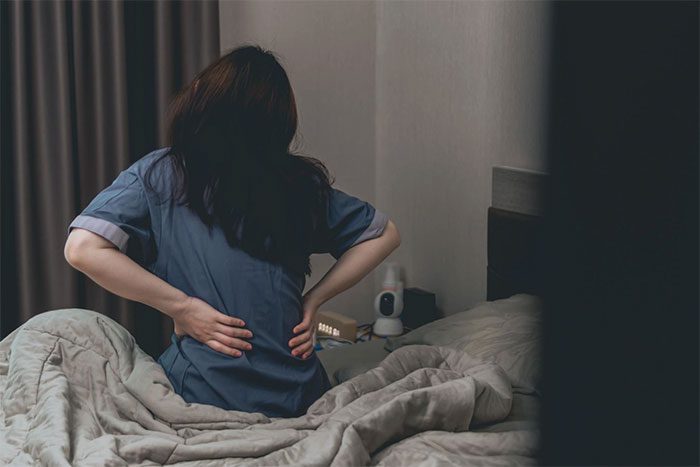
Lifestyle changes can help prevent nighttime hip pain. (Photo: Internet).
4. When to See a Doctor for Nighttime Hip Pain?
If the pain lasts for several days and/or prevents you from performing normal activities, you may need to see a doctor, especially if the hip pain becomes a burden that makes it difficult for you to walk, and nighttime pain relief methods are ineffective.
You should seek early medical attention if your hip joint appears deformed, is immobile, experiences severe pain, or has sudden swelling, along with symptoms such as fever, chills, or other signs of hip infection.
To diagnose hip pain, your doctor may request several imaging tests, such as hip X-rays or an MRI, to identify joint damage or fractures, along with examinations to check for swelling or tenderness in your hip area. The doctor will also assess the range of motion in the joint to look for signs of hip arthritis or hip tendonitis.
5. Conclusion
Nighttime hip pain can occur due to various conditions. Common causes include bursitis, arthritis, tendonitis, sciatic nerve pain from the piriformis muscle, and pregnancy. This condition may also result from sleeping positions or inadequate mattresses and pillows.
Treatment for nighttime hip pain may include adjusting your sleeping position, using a pillow between your knees to keep your hips aligned, and other pain management methods such as oral non-steroidal anti-inflammatory drugs, corticosteroid injections, or heat/cold therapy.
Additionally, maintaining gentle movement during the day and having good sleep habits can help alleviate pain. If hip pain affects your nightly sleep, it is advisable to consult a doctor for appropriate diagnosis and treatment.









































